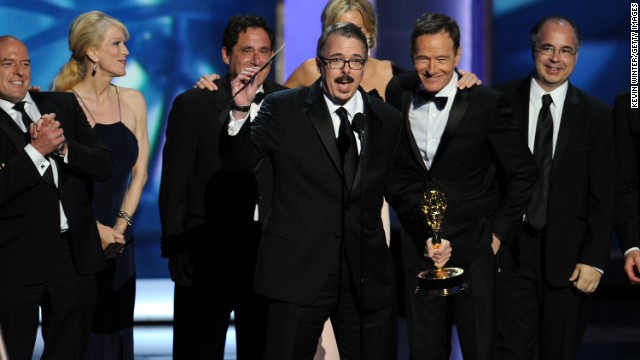 “Breaking Bad” got its swan song serenade Sunday at the Emmy Awards, winning its first best drama award to end the three hour telecast — and earning Anna Gunn a best supporting actress win — even as the dark show was airing its penultimate episode on cable.
“Breaking Bad” got its swan song serenade Sunday at the Emmy Awards, winning its first best drama award to end the three hour telecast — and earning Anna Gunn a best supporting actress win — even as the dark show was airing its penultimate episode on cable.
But ever unpredictable, the best actor Emmy went not to its Bryan Cranston (or leading men from “Homeland,” “Mad Men,” “Downton Abbey” or “House of Cards”). Instead, it went to Jeff Daniels of “The Newsroom,” perhaps as the only way to honor a series otherwise unrepresented in the balloting.
This was not a huge affront, as I’m sure some people are taking this. The Emmys are largely meaningless and “The Newsroom” is not as hateful as some would have you believe, even if it doesn’t have killing in it.
But it showed how surprising Emmy winners can be. After the first awards of the long night — best supporting actors in comedies — of Merritt Wever of “Nurse Jackie” and Tony Hale on “Veep” you thought: well maybe they’re breaking ground here, voting for people who actually might deserve it.
And there were some wins to applaud, too, from Laura Linney in “The Big C: Hereafter,” listed in miniseries; to Julia Louis-Dreyfus of “Veep” as lead actress in a comedy.
But other victories seemed merely reflexive: “Modern Family” winning for the fourth year in a row as best comedy, though it’s still pretty strong; Jim Parsons as best leading male in a comedy; Claire Danes as best actress in a drama for “Homeland” for the second year running.
“House of Cards” for all its hype as being the show that would break Emmy records for being not on broadcast or cable, the Netflix production brought just one major award in drama writing for director David Fincher.
Although Bobby Canavale (supporting actor, “Boardwalk Empire”) was its only other major series acting award, HBO still ended up with the most Emmys — 26 – largely because of its high profile Liberace bio movie “Under the Candelabra,” a kind of can’t miss in Hollywood, which won best movie or miniseries and got star Michael Douglas an Emmy as well as director Steven Soderbergh (who also won in editing the week before, under the pseudonym he used).
The one show with the most Emmy nominations going in got only one Sunday night, James Cromwell for supporting role in “American Horror Story: Asylum.” Ellen Burstyn won for her role as a meddling mother in USA’s “Political Animals” in the miniseries category.
“The Colbert Report” won best variety and best variety writing for the first time after a 10-year run by the show from which it sprang, “The Daily Show with Jon Stewart.”
Neil Patrick Harris proved an affable but overused host of the event, with half of his stuff falling flat, the filmed bits uninspired and the dancing bits expected but welcomed (bringing choreography to the prime time broadest meant a big and splashy production number from the nominees).
Still, Steve Levitan of “Modern Family” was right in calling it “the saddest Emmys ever” as it included teary remembrances of a handful of TV stars who died the past year as well as the usual “In Memoriam” section.
There seemed little reason to salute the 50th anniversary of the March on Washington/JFK assassination/Beatles invasion other than tip the hat to baby boomers who remember it; there was even less reason for Elton John to introduce a new song in honor of Liberace (save it for the Grammys, Sir E).
The Emmys doesn’t need to spend time trying to sell the audience on watching TV; the set is already on.